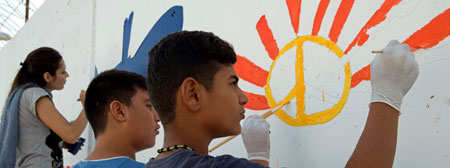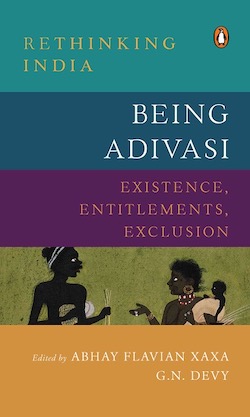2024 celebrations

International Day of the World’s Indigenous People (9 August) >>
The theme of International Mother Language Day celebration 2024 is “Multilingual education is a pillar of intergenerational learning”. Today, 250 million children and young people still do not attend school and 763 million adults do not master basic literacy skills. Mother tongue education supports learning, literacy and the acquisition of additional languages.
The event organized by UNESCO on 21 February will include two panel discussions on multilingual education as a key component of quality learning.
How to celebrate Mother Language Day in your school | Read the updates here >>
Schoolteachers
- Encourage children to use their mother languages to introduce themselves and talk about their families and culture
- Celebrate culture by having them read poetry, tell a story or sing a song in their mother tongues. Paintings and drawings with captions in mother languages can also be displayed.
One’s mother tongue is closest to any person as is one’s mother. It is from the mother that a child learns language skills. No mother ever teaches a newborn the rules of grammar; yet all those extremely complicated rules are internalised by the child by merely watching the lip movements and gestures of its mother and by imbibing the tones and textures of her speech. There is a somewhat wrong and widespread impression that children learn languages in school. That may be true of the languages other than the language of one’s home. One has to “learn” through grammar and translation the second or the third language, or more. But, the making of the human brain allows a child to learn most of the complexities of the mother tongue by the time the child is three years old. Writing is another matter. In any case, in the several million years history of Homo sapiens, writing emerged as an apparatus of expression, communication, and memory-storing just about seven thousand years ago. Language is essentially speech; writing is an additional feature that enables long-distance and inter-generational language transactions.
Ganesh Devy in “Languages not liked by Hindutva ideology suffer existential crisis”, Frontline Magazine, 15 June 2023 >>
Publications
- See how many mother languages your fellow students speak. Make a survey of the languages by interviewing them and publish the results on internet.
- Help organize cultural activities such as films, plays and music that celebrate different languages.
- Mother tongue-based multilingual education: the key to unlocking SDG 4: quality Education for All, UNESCO Bangkok, 2017
- MTB MLE resource kit: Including the excluded: promoting multilingual education, UNESCO Bangkok, 2016
- Literacy in multilingual and multicultural contexts: effective approaches to adult learning and education, UNESCO-UIL, 2016
- If you don’t understand, how can you learn?, Global Education Monitoring Report Policy Paper 24, UNESCO, 2016
- 2016 Global Monitoring Report section on Languages, UNESCO, 2016
- UNESCO Atlas of the World’s Languages in Danger
UN and UNESCO resolutions
- UNESCO resolution proclaiming “International Mother Language Day” to be observed on 21 February, 1999, following a proposition made by People’s Republic of Bangladesh
- Resolution adopted by UN General Assembly on multilingualism(link is external), 2002
- Report by UNESCO Director-General on a strategy concerning the role of languages in achieving Education for All (EFA) in the context of sustainable development, 2009
- UN Declaration on the Rights of Indigenous Peoples(link is external), 2008
- Universal Declaration on Cultural Diversity, 2001
- Declaration on the Rights of Persons Belonging to National or Ethnic Religious and Linguistic Minorities(link is external), 1992
Background
Follow us!
- Follow us on social media: #MotherLanguageDay(link is external)
On International Mother Language Day 2018, celebrated every year on 21 February, UNESCO reiterates its commitment to linguistic diversity and invites its Member States to celebrate the day in as many languages as possible as a reminder that linguistic diversity and multilingualism are essential for sustainable development.
UNESCO has been celebrating International Mother Language Day for nearly 20 years with the aim of preserving linguistic diversity and promoting mother tongue-based multilingual education. | Read the full post on the Unesco website >>
Linguistic diversity and multilingual education
Language teaching and particularly multilingual education are a key factor in the development of understanding among peoples and dialogue for peace. Accordingly, during the current biennium, UNESCO has redoubled its activities aimed at promoting linguistic diversity at all levels of education and encouraging the practice of multilingualism. At the same time, it has reinforced its action to protect and enhance the linguistic heritage, especially that of indigenous populations and people belonging to minorities. The LINGUAPAX project has been refocused in such a way as to incorporate these different objectives within a harmonious framework of action. […]An “International Mother Language Day” launched and to be observed on 21 February. | Learn more >>
Source: Approved Programme and budget, 2000-2001
URL: https://unesdoc.unesco.org/ark:/48223/pf0000120679.page=184
Date visited: 25 January 2019
Find publications by reputed authors (add “open access” for freely downloadable content)
“[T]he Constitution gives equal respect to all communities, sects, lingual and ethnic groups, etc. The Constitution guarantees to all citizens freedom of speech (Article 19), freedom of religion (Article 25), equality (Articles 14 to 17), liberty (Article 21), etc.” – Supreme Court judgment quoted by The Hindu in “India, largely a country of immigrants” >>
In Marginalised but not Defeated, Tarun Kanti Bose (a seasoned public interest journalist) “documents the hard and difficult struggle to implement the Forest Rights Act, how the oppressed adivasis have united into forest unions, how they are now entering into new thresholds of protracted struggles and victories in a non-violent manner. […] A must for all young journalists, social science students, editors, civil society groups and the academia.” | Read the full book review here:
https://countercurrents.org/2023/05/book-review-marginalised-but-not-defeated >>
Learn more about “The world’s largest democracy“, its Constitution and Supreme Court and linguistic heritage, and why Democracy depends on Accountability in the face of Modernity and Globalization >>
Find up-to-date information provided by, for and about Indian authors, researchers, officials, and educators
List of web portals covered by the present Custom search engine
Ashoka Trust for Research in Ecology and the Environment (ATREE) – www.atree.org
Freedom United – www.freedomunited.org
Government of India (all websites ending on “.gov.in”)
Kalpavriksh Environmental Action Group – https://kalpavriksh.org
Shodhganga (a reservoir of Indian theses) – https://shodhganga.inflibnet.ac.in
Survival International – www.survivalinternational.org
UCLA Digital Library – https://digital.library.ucla.edu
Unesco – https://en.unesco.org
Unesco digital library – https://unesdoc.unesco.org
Unicef – www.unicef.org
United Nations – www.un.org/en
Video Volunteers – www.videovolunteers.org
WorldCat (“the world’s largest library catalog, helping you find library materials online”) – https://worldcat.org
To search Indian periodicals, magazines, web portals and other sources safely, click here. To find publishing details for Shodhganga’s PhD search results, click here >>
Search tips
Combine the name of any particular state, language or region with that of any tribal (Adivasi) community.
Add keywords of special interest (music, poetry, dance just as health, sacred grove and biodiversity); learn about the rights of Scheduled Tribes such as the “Forest Rights Act” (FRA); and the United Nations “Declaration on the Rights of Indigenous Peoples”, “Universal Declaration of Human Rights”, “women’s rights”, or “children’s right to education”.
Ask a question that includes “tribal” or “Adivasi”, for instance: “Adivasi way of life better?” (or “tribal way of life worse?”)
Specify any particular issue or news item (biodiversity, bonded labour and human trafficking, climate change, ecology, economic development, ethnobotany, ethnomedicine, global warming, hunter-gatherers in a particular region or state, prevention of rural poverty, water access).
For official figures include “scheduled tribe ST” along with a union state or region: e.g. “Chhattisgarh ST community”, “Himalayan tribe”, “Scheduled tribe Tamil Nadu census”, “ST Kerala census”, “Particularly Vulnerable Tribal Group Jharkhand”, “PVTG Rajasthan”, “Adivasi ST Kerala”, “Adibasi ST West Bengal” etc.
In case the Google Custom Search window is not displayed here try the following: (1) toggle between “Reader” and regular viewing; (2) in your browser’s Security settings select “Enable JavaScript” | More tips >>
Note: hyperlinks and quotes are meant for fact-checking and information purposes only | Disclaimer >>
Some clarifications on caste-related issues by reputed scholars >>

Search publications via Indian publishers & libraries:
Virginius Xaxa & Ganesh Devy or G.N. Devy >>
See also
Adivasi Academy & Museum of Adivasi Voice at Tejgadh | Lecture “A View of Higher Education in India”
Appropriate education for Adivasi children – the Vidyodaya School model at Gudalur
Childhood | Children’s books | Childrens rights: Education | UNICEF India | Safe search
People’s Linguistic Survey of India | Volumes (PLSI) | PeoplesLinguisticSurvey.org
Multi-lingual education | Residential school | Ekalavya
Multilingual education is a pillar of intergenerational learning – Unesco
Santali education | Teaching Santal children by Boro Baski
Unesco | Unicef | Unicef India | United Nations
United Nations International Days and Weeks
Video | “Nations don’t make us human – languages make us human”: Ganesh Devy
Women | Safe search | President Droupadi Murmu on women’s empowerment